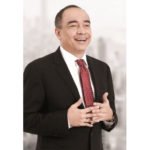Junta Chief: PRIME MINISTER Prayut Chan-o-cha appears to have made up his mind to take a risky political journey after publicly admitting for the first time yesterday that he was “interested in political work”. Of course, he said, his future would depend on “how people see it”.
However, Prayut has remained tight-lipped as to which political party he is going to join and run as its PM candidate, though observers and the media have pointed to a new outfit called Palang Pracharat. The party plans to nominate Prayut as its PM candidate and certain government figures are expected to join it.
Critics say preparations have been made for Prayut’s comeback as prime minister, including favourable new laws and regulations, along with recent political moves.
He has been under pressure to reveal his plans, but it has been a dilemma for him. Staying silent about his political future will see him being pestered by the media and critics, while making his political plans clear risks attacks from politicians who see him as their rival.
Another question has emerged as to whether the former Army chief should step down as NCPO leader. His continued tenure could be seen as being more advantageous versus other competitors, as the junta leader has unrestricted power over all branches of government. When asked about it by a Government House reporter yesterday, he responded with a clear “No”.
He is aware of the negative impacts, but he has no choice. Prayut had earlier refused to answer reporter’s questions about his political future, saying that if he clarified it early, he risked getting attacked early.
And that appeared to have come true yesterday, as politicians started aiming their attacks at him.
Korkaew Pikulthong, a Pheu Thai Party politician and key red-shirt leader, yesterday called on Prayut to come to power through election the next time.
“That way is dignified,” he said, obviously referring to the fact that Prayut took power through a military coup.
“General Prayut has all the power mechanisms in his hands and has an advantage over all the political parties. So it is not difficult for him to enter politics,” he said.
Governing as an elected prime minister is another matter. Korkaew noted that Prayut would no longer have post-coup power, but would instead face scrutiny by the parliamentary opposition and the media.
Watana Muangsook, another key Pheu Thai figure, said yesterday that Prayut had an advantage over fellow politicians by refusing to step down as NCPO leader, while prohibiting political parties from campaigning.
“I am not surprised with what he said. He has made it clear from the beginning that he wants to be in power, but is afraid of contesting an election,” Watana wrote on Facebook.
Prayut was not alone yesterday. PM’s Office Minister Kobsak Pootrakool said he has developed an interest in politics after having worked in the government over the past few years.
“I am happy we have been able to help people. In the future, we may continue offering benefits to the people,” he said yesterday.
Industry Minister Uttama Savanayana yesterday also voiced his interest in politics. He said he was weighing his opportunity to continue his political work.
Uttama and Kobsak are expected to take key positions in the pro-Prayut Palang Pracharat Party, which is scheduled to convene its general meeting this Saturday.
The picture will be clear when the party selects its executive members and announces its election plan.




